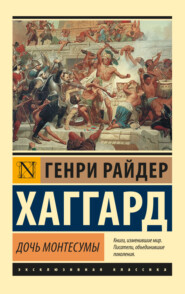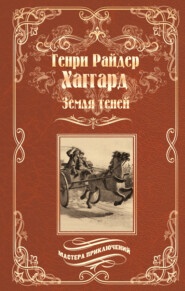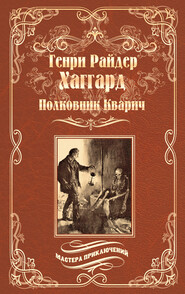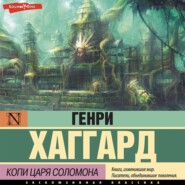По всем вопросам обращайтесь на: info@litportal.ru
(©) 2003-2024.
✖
Belshazzar
Настройки чтения
Размер шрифта
Высота строк
Поля
“And what did they say, Belus?” asked Amasis leaning forward.
Belus dropped his voice and answered,
“They said that the star of Apries wanes, while that of Amasis grows bright. They said that ere long where shone the star of Apries, will shine the star of Amasis alone, though first for a time those two stars will ride in the heavens side by side. That is what they said though I told Apries another tale.”
“Do you mean the throne?” asked Amasis in a whisper.
“Aye, the throne and a certain general wearing Pharaoh’s crown.”
For a while there was silence, then Amasis asked,
“Does Pharaoh send you to poison me, as doubtless you can do, you strange and fateful Belus, who like a night-bird, have flitted from Babylon to Egypt for your own dark and secret purpose?”
“Nay, and if he did, I, their servant, am not one to fight against the stars. Fear nothing from me who am your friend, though there are others whom you will do well to watch. Now, General, here in this camp I am in your power. You can kill me if you will, but that would be foolish, for I have not told you all the horoscope.”
“Your meaning?”
“It is that if you kill me, as I think you had it in your mind to do but now, me or another, that star of yours will never shine alone, because my blood will call for yours. Am I safe with you and if I need it, will you protect me when you grow great?”
“You are safe and I will protect you now and always. I swear it by Amen and by Maat, Goddess of Truth. Yet, why do you turn from Pharaoh who has sheltered you ever since you escaped from Babylon? – for I have heard that you did escape on account of some crime.”
“Because Pharaoh turns from me and presently will seek my life; indeed I think that he seeks it already. For the rest, the crime of which you have heard was not mine, but that of another – upon whom I wait to be avenged in some far-off appointed hour,” he added and as he spoke the words, his face grew fierce and even terrible.
“Be plain, Belus, but tell me first, who is this with you who listens to our most secret thoughts? How comes it that I never noted him?”
“Perchance because I willed that you should not, General, or perchance because wine dims the eyes. But look on him, and answer your own question.”
As he spoke, very swiftly Belus bent forward and unclasped the long cloak which I wore, revealing me clad as a soldier with an armoured cap upon my head. Amasis stared at me.
“By the gods!” he said, “this is none other than Ramose, Pharaoh’s bastard and my pupil in arms whom I love well. Now what does this young cock here? Is he another of Pharaoh’s spies whom you have brought to be your witness?”
“A poor spy, I think, General. Nay, like me he flies from Pharaoh’s wrath. There has been trouble in the palace. A certain Syrian queen whom you will remember, for in truth she sent you here, has come to her end – a swift and bloody end – as has her minister.”
“I have heard as much, for rumour of the death of great ones flies more swiftly than a dove, but what has that to do with Ramose? Did he perchance stifle her with kisses, as I would have done at his age?”
“Nothing, nothing at all, General. But Ramose was her guardian and chamberlain, and Pharaoh demands his life in payment for hers, so do her Syrians, or will ere long. Therefore he seeks refuge under the shield of Amasis, his captain.”
“And shall have it, by the gods. Am I a man to give up one who has served under me, over the matter of a woman, even to Pharaoh’s self? Not so, and yet I must remember that this youngster is Pharaoh’s son and half a Greek and has heard words that would set a noose about my neck. Do you vouch for him, Belus?”
“Aye, Amasis. Listen. From boyhood this lad has been as one born to me and I, who now am – childless – love him. He has been drawn into trouble, and thereby, as I fear, embroiled Syria and Egypt. Therefore his life is forfeit, as is mine who have befriended him and aided his escape. Therefore, too, both of us have fled to you, and henceforward swear ourselves to your service, looking to you to shield us. Tell us, may we sleep in peace, or must we seek it elsewhere?”
“Yes, you may sleep easy, even from Pharaoh, for here in this camp I am Pharaoh,” answered Amasis proudly. “Have I not sworn it already and am I a troth-breaker?” he added.
Scarce had the words passed his lips when from without came a sound of sentries challenging, followed by a cry of “Pass on, Messenger of Pharaoh.” The tent opened and there appeared a travel-stained man clad in Pharaoh’s uniform, who bowed, handed a roll to Amasis and at a sign, retired.
“Pharaoh sends me many letters,” he said, as he cut the silk and undid the roll. Then he read, looked up and laughed.
“Your guardian spirit must be good, Belus. At least you two were wise to take that oath of me upon the instant. Hearken to what is written here,” and he read aloud,
“Pharaoh to the General Amasis, “The Syrians who came hither with the Queen Atyra who is dead, as the price of the friendship of their nation to Egypt, demand the life of the Count Ramose who was her chamberlain, because he failed in his duty and did not keep her safe; also because as they allege he murdered one Ninari. If he has fled to your camp disguised as a scribe, as is reported, put him to death and send his head to Sais that it may be shown to them. With it send Belus the Babylonian, that the truth of all this matter may be wrung from him. “Sealed with the seals of Pharaoh and his Vizier.”
“Now, Belus,” went on Amasis, “tell me, you who are wise in counsel, what shall I do? Obey Pharaoh or my oath?”
I listened like to one in a dream, but Belus answered quietly,
“Which you will, Amasis. Obey Pharaoh, cause this lad to be murdered and send me to the torturers at Sais, and see your star set – as I promised you. Obey your oath, and see that star shine out above all storms, royally and alone. Yet, is it needful to urge Amasis to honesty by revealing what Thoth has written concerning him in the Book of Fate?”
“I think not,” answered Amasis with his great laugh. “Do they not say of me in Egypt that never yet did I break troth with friend or foe, and shall I do so now? Young man, I see that you have scribe’s tools about you; therefore be seated and write these words:
“From Amasis the General, to Pharaoh, “The letter of Pharaoh has been received. Know, O divine Pharaoh, that it is not the custom of Amasis to kill those who are serving under him in war, save for cowardice or other military offence. If the Syrians have aught against the Count Ramose, let them come hither and set out their case before me and my captains. For the rest, Belus the Babylonian, whom the good god Pharaoh sent hither to watch me, is too weary to travel. Moreover, I keep him at my side that I may watch him.”
When I had finished writing, Amasis read the roll, sealed it and summoning an officer, bade him to give it to the messenger to be delivered to Pharaoh at Sais. When the officer had gone he thought a while, and said in his open fashion,
“The quarrel between me and Pharaoh or rather between the Egyptians and his friends the Greeks, has long been brewing. It is strange that it should have boiled over upon the little matter of this young Count and his love affairs, yet doubtless so it was decreed. Have no fear, Ramose, Pharaoh is cowardly for otherwise he would not seek the life of his own son for such a trifle from dread born of Syrian threats; a tyrant also and when tyrants are taken by the beard, they grow afraid. Yet my counsel to both of you is, to keep out of the reach of Pharaoh’s arm till this business is forgotten. If ever he speaks of it to me again, I will tell him to his face that he should thank me who have saved him from the crime of murdering his son, whose blood would have brought the curse of the gods upon him. Now drink a cup of wine, both of you, and let me hear this tale of the death of Atyra, if she be dead in truth.”
So I told it to him, keeping nothing back. When it was done, he said,
“I am glad that you threw that Syrian rat through the window-place, sending him to settle his account with Atyra in the underworld. Grieve not, young man. There are more women left upon the earth who will teach you to forget your trouble, and for the rest this ill-fated lady was one hard to be resisted. Now, go rest. To-morrow I will find you a place in my bodyguard and we shall see whether you are luckier in war than you have been in love.”
Thus he spoke though in the after years, when he had ceased to be a bluff general and had become a wily Pharaoh steeped in statecraft, he forgot, or pretended to forget all this story and asserted that Atyra had borne me a child before her death. But of this in its season.
That night ere I slept, for the first time I opened all my heart to Belus, showing him how great was its bitterness and woe. Moreover I told him that if I escaped the wrath of Pharaoh and the accidents of war, I had sworn an oath before the gods to have no more to do with women.
“I rejoice to hear it, Son,” answered Belus, with his strange wise smile, “and I pray that the memory of the gods of Egypt is not too long. You say that you have done with women, but mayhap women have not done with such a man as you, nor because one has brought you sorrow, is it certain that another may not bring you joy. Now grieve no more over what cannot be mended nor for her who is dead because of you, but follow after Fortune with a brave heart, for such she loves. Only one thing I hope of you, that you will suffer me, your master, to stay at your side through bad weather and through good, until perhaps I am drawn away to fulfil the purpose of my life.”
Then without telling me what was that purpose, he kissed me on the brow and I laid me down and slept.
Chapter 6
The Gift of God
Next day the march began. I saw and knew all, for Amasis, a man of his word in those days, appointed me to be an officer of his guard, also, because I was a scholar, one of his private scribes. Further he kept Belus in attendance on him, so that between us we learned all there was to know. Thus I came to understand how great was the power of Amasis, the beloved of the soldiers.
About him was none of the ceremonial of Pharaoh’s court. His captains were his fellows; also he drank, jested and bandied stories, some of them coarse enough, with the common soldiers round their fires. A man of the people himself, he talked to them of their fathers, yes, and mothers too. He asked no great reverence from them, nor that any man should bow to the dust when he passed by and to many a fault he was blind. If one off duty drank too much, or broke camp to seek some girl who had looked at him kindly, he said nothing; but if such a one did these things when he was on duty, then let him beware, for he would be flogged, or even hanged. No man was promoted for lip-service or because his birth was high, but to those who were brave and loyal every door was open. Therefore the army loved him, so much indeed that he dared to defy Pharaoh in such a letter as he had written concerning Belus and myself, and yet fear nothing.
Some thirty or forty thousand strong not counting the camp-followers, we marched against the Babylonians, a great host of them under the command of Merodach, said to be a son of Nebuchadnezzar, who awaited us beyond the borders of Egypt. Or rather they did not await us for as we came on, they retreated. Then we discovered that we were being led into a trap, for Syrians by the ten thousand, were hanging on our flank waiting to cut us off. Belus learned this from spies whom we had taken, but who, it seemed, belonged to some secret brotherhood of which he was a chief.
For although Belus was willing to fight against his own people, I found that among them he still had many friends. This at the time I could not understand, for not until many years had gone by did I come to know that the Babylonians were divided among themselves, numbers of them hating the kings who ruled over them and all their cruelties and wars.
So Amasis separated his army. Half of it he left entrenched upon a range of little hills that encircled an oasis where there was water in plenty, beyond which hills the Babylonians had retreated, thinking to draw us into the desert on their further side. The rest, among whom were nearly all the horsemen and chariots, he sent to swoop down on the Syrians. Making a long night march we caught them at the dawn just as they were breaking camp. Until we fell upon them they did not know that we were near. Therefore, although they outnumbered us by three to one, our victory was great. Hemming them round in the gloom, we attacked at daybreak and slew thousands of them before they could form their ranks. Also we made prisoners of thousands more and took a great booty of horses and camels.
This done we returned to the low hills in a fortunate moment, for discovering that the half of our army was gone, at length the Babylonians had determined to attack. Night was falling when we reached the camp and therefore they did not see us advancing under cover of the hills. Some of us, I among them, pushed on and made report to Amasis of how it had gone between us and the Syrians, a tale that pleased him greatly. Moreover, having heard me well spoken of by those under whom I served for the part I played in that fray, he promoted me to be captain of a company of which the officer had been killed by an arrow. This company was part of what was called the General’s Legion, appointed to surround him in battle and to fight under his own command. I knew it already, since from it was drawn his bodyguard, of whom I had been one until I was sent out against the Syrians.
Next morning at the dawn from the crest of our hills, far away upon the plain and half hidden by clouds of dust, we saw the Babylonians approaching, a mighty host of them. Indeed so countless were they and so vast was their array, that at sight of it my heart sank for it seemed as though for every man of ours they could count ten. While I stood staring at them, suddenly I found Amasis himself at my side wrapped in a common soldier’s cloak.
“You are afraid, young man,” he said. “Your face shows it. Well, I think none the worse of you for that. Yet take courage, since it is not numbers that make an army terrible, but discipline and the will to conquer. Look now at this great host. As its standards show, it is made up of many peoples all mixed together. See, it keeps no good line, for its left wing is far advanced and its right straggles. Also its centre, where is Merodach, the king’s son, with his chosen guards, is cumbered with many waggons and litters. In those waggons are not food or water, but women, for these soft Babylonians soaked in luxury, will not move without their women even in war, and they must be protected. Therefore I say to you, and to all, be not afraid.”
Then he departed to talk to others.

















